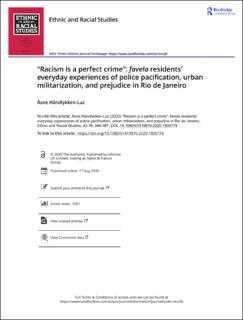| dc.contributor.author | Håndlykken-Luz, Åsne | |
| dc.date.accessioned | 2021-03-12T13:02:11Z | |
| dc.date.available | 2021-03-12T13:02:11Z | |
| dc.date.created | 2021-01-30T16:53:03Z | |
| dc.date.issued | 2020 | |
| dc.identifier.citation | Håndlykken-Luz, Å. (2020). “Racism is a perfect crime”: favela residents’ everyday experiences of police pacification, urban militarization, and prejudice in Rio de Janeiro. Ethnic and Racial Studies, 43(16). | en_US |
| dc.identifier.issn | 0141-9870 | |
| dc.identifier.uri | https://hdl.handle.net/11250/2733180 | |
| dc.description.abstract | This article examines residents’ everyday experiences and perceptions of changing urban politics and racism in a “pacified” favela, or poor informal neighbourhood, in Rio de Janeiro, drawing on longitudinal ethnographic data from 2011 to 2018. The findings suggest that despite a discourse on inclusion, human rights, and citizenship, the police pacification program and urban security interventions aimed at “civilizing” the favela’s residents as “undesirable others,” drawing on racialization. The naturalization, legitimization, and reproduction of police violence promote the operation of racial and socio-spatial inequalities and privileges through what I describe as pigmentocratic everyday practices. These processes continually shape the condition of possibilities for the dehumanization of blackness, exclusion, inclusion, and resistance in a society influenced by the myth of racial democracy and that celebrates both diversity and ideologies of whitening. | en_US |
| dc.language.iso | eng | en_US |
| dc.rights | Attribution-NonCommercial-NoDerivatives 4.0 Internasjonal | * |
| dc.rights.uri | http://creativecommons.org/licenses/by-nc-nd/4.0/deed.no | * |
| dc.title | “Racism is a perfect crime”: favela residents’ everyday experiences of police pacification, urban militarization, and prejudice in Rio de Janeiro | en_US |
| dc.type | Peer reviewed | en_US |
| dc.type | Journal article | en_US |
| dc.description.version | publishedVersion | en_US |
| dc.rights.holder | © 2020 The Author(s). | en_US |
| dc.source.pagenumber | 348-367 | en_US |
| dc.source.volume | 43 | en_US |
| dc.source.journal | Ethnic and Racial Studies | en_US |
| dc.source.issue | 16 | en_US |
| dc.identifier.doi | https://doi.org/10.1080/01419870.2020.1800774 | |
| dc.identifier.cristin | 1883349 | |
| cristin.ispublished | true | |
| cristin.fulltext | original | |
| cristin.qualitycode | 2 | |

